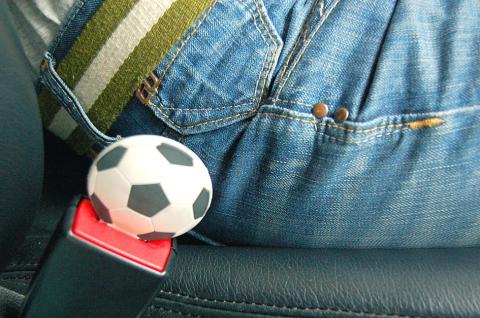The “child safety seat” and “silent buckle” — used to quieten car seatbelt alarms — are popular products. Manufacturers even boast of such products having passed national standard inspections.
The only problem? While the products may not be illegal per se, using them certainly is.
According to the Road Traffic Security Rules (道路交通安全規則), bicycles are barred from carrying passengers, and violators could face a fine of between NT$300 and NT$600, an official with the Ministry of Transportation and Communications’ Department of Railways and Highways said. However, in practice the police do not ticket violators and the public flouts the rules.

Photo: Tseng Hung-ju, Taipei Times
The legal authorities are at an even greater loss when it comes to disciplining the manufacturers of such unsafe products. They have their hands tied because of a lack of relevant regulations.
In the meantime, large numbers of parents continue to take their children to school or on outings in the safety seat, and are no doubt reassured that the seat has cleared a quality inspection.
Meanwhile, demand is rising for the “silent buckle,” retailers said.
In August last year the ministry made it compulsory for backseat passengers to buckle up, in a bid to reduce the death toll from road accidents.
A decade ago, the ministry made it compulsory for front-seat passengers to wear seat belts, and then decreed that automobile manufacturers must equip cars with a seat-belt reminder light or some kind of warning alarm, activated by a pressure sensor under the passenger seat, to persuade people to belt up.
However, by plugging in the silent buckle the seatbelt alarm is disabled and the annoying alarm tone, that would otherwise force passengers into buckling up, goes silent. Priced between NT$100 and NT$200, a driver can purchase a dozen of the devices for less than the price of a traffic ticket.
With the latest legislation requiring back-seat passengers to buckle up, sales volumes have increased by at least 30 percent, auto parts retailers said, adding that they have been busy replenishing their stocks to meet the growing demand.
Lin Fu-shan (林福山), head of the ministry’s Department of Railways and Highways’ supervision section, said the two products are in clear violation of the regulations, but there is no law to penalize producers of the illegal products.
Lin said that installing child safety seats on bikes is against regulations, but is mostly considered a trivial offense and is not reported. Violators usually only receive a warning instead of being fined, he said.
Translated by Stacy Hsu, Staff Writer

Japanese footwear brand Onitsuka Tiger today issued a public apology and said it has suspended an employee amid allegations that the staff member discriminated against a Vietnamese customer at its Taipei 101 store. Posting on the social media platform Threads yesterday, a user said that an employee at the store said that “those shoes are very expensive” when her friend, who is a migrant worker from Vietnam, asked for assistance. The employee then ignored her until she asked again, to which she replied: "We don't have a size 37." The post had amassed nearly 26,000 likes and 916 comments as of this

US President Donald Trump said "it’s up to" Chinese President Xi Jinping (習近平) what China does on Taiwan, but that he would be "very unhappy" with a change in the "status quo," the New York Times said in an interview published yesterday. Xi "considers it to be a part of China, and that’s up to him what he’s going to be doing," Trump told the newspaper on Wednesday. "But I’ve expressed to him that I would be very unhappy if he did that, and I don’t think he’ll do that," he added. "I hope he doesn’t do that." Trump made the comments in

Tourism in Kenting fell to a historic low for the second consecutive year last year, impacting hotels and other local businesses that rely on a steady stream of domestic tourists, the latest data showed. A total of 2.139 million tourists visited Kenting last year, down slightly from 2.14 million in 2024, the data showed. The number of tourists who visited the national park on the Hengchun Peninsula peaked in 2015 at 8.37 million people. That number has been below 2.2 million for two years, although there was a spike in October last year due to multiple long weekends. The occupancy rate for hotels

A cold surge advisory was today issued for 18 cities and counties across Taiwan, with temperatures of below 10°C forecast during the day and into tonight, the Central Weather Administration (CWA) said. New Taipei City, Taipei, Taoyuan and Hsinchu, Miaoli and Yilan counties are expected to experience sustained temperatures of 10°C or lower, the CWA said. Temperatures are likely to temporarily drop below 10°C in most other areas, except Taitung, Pingtung, Penghu and Lienchiang (Matsu) counties, CWA data showed. The cold weather is being caused by a strong continental cold air mass, combined with radiative cooling, a process in which heat escapes from